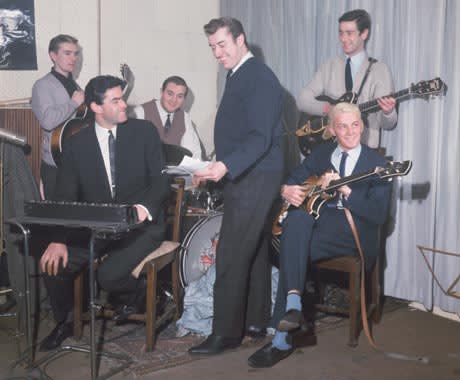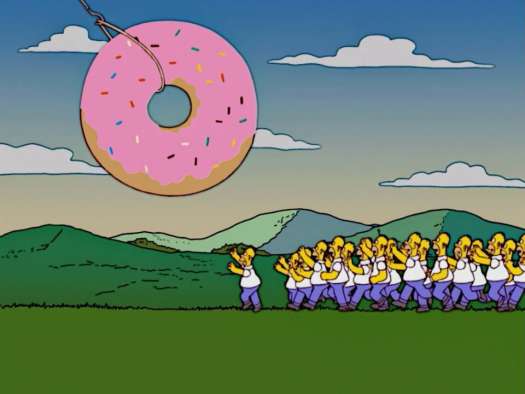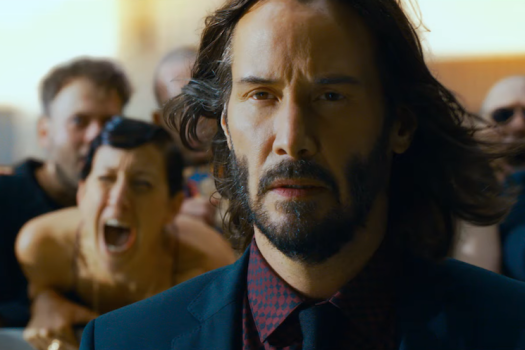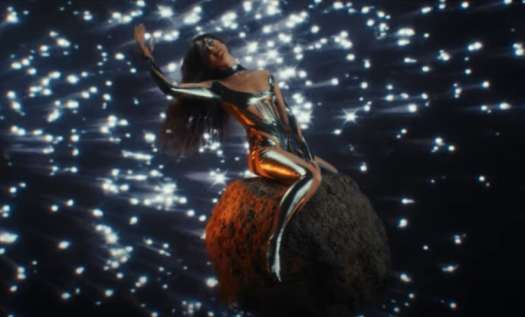Even if Joe Meek's name isn't immediately familiar, the music that he masterminded back in the 1950s and '60s will be. His best-known tune was "Telstar" by the Tornados, which was a worldwide hit in 1962, although he had a hand in many more familiar pop songs on both sides of the Atlantic. He's sometimes called the British Phil Spector, although he used decidedly different techniques in the studio and was probably an influence upon Spector instead. And in addition to his musical prowess, he also lived the kind of life that has made him the perfect fodder for a documentary like A Life In The Death of Joe Meek.
The movie has existed in various forms since 2008, when it was shown at several film festivals as a work in progress, and then went through a Kickstarter campaign in order to get it into finished form. It was well worth the wait; A Life In The Death of Joe Meek is a wonderful documentary. Clocking in at almost two hours in length, it is a very comprehensive look at his life, yet it doesn't feel overly long. Unlike other attempts to share his story, such as 2008's fictional take Telstar, Meek isn't simply portrayed as an eccentric musical oddball. It's a warts and all look at his life, never shying away from Meek's notorious bad temper, his dalliances with the occult or the fact that he was gay at a time when it was illegal in the UK. The film stops short of passing any kind of judgment on those elements — the people interviewed understand that some of his behaviour was a product of the times and his situation.
It helps that the narrative is driven by a wealth of fascinating interviews. In addition to the expected family members and artists who worked with Meek in his ramshackle home studio, including Jimmy Page, who worked as a session musician for him, there are also a handful of Meek aficionados and fans such as Edwyn Collins and Super Furry Animals' Huw Bunford to share their opinions on Meek's legacy and influence. Add to that plenty of footage from back in the day and a ton of music, and it makes for an enthralling film.
There are some wonderful anecdotes about the unorthodox methods Meek used to get the sound he wanted — he put microphones directly on bass drums, or attached them under stairs to record foot stomping. He was always experimenting in the studio, using technology in ways that were ahead of their time — he was one of the first people to use tape loops and overdubbing at a time when sound engineering was about recording "pure" sounds.
The filmmakers finish by focusing on his music, which is fitting: that is the perfect epitaph for a visionary like Joe Meek.
(Independent)The movie has existed in various forms since 2008, when it was shown at several film festivals as a work in progress, and then went through a Kickstarter campaign in order to get it into finished form. It was well worth the wait; A Life In The Death of Joe Meek is a wonderful documentary. Clocking in at almost two hours in length, it is a very comprehensive look at his life, yet it doesn't feel overly long. Unlike other attempts to share his story, such as 2008's fictional take Telstar, Meek isn't simply portrayed as an eccentric musical oddball. It's a warts and all look at his life, never shying away from Meek's notorious bad temper, his dalliances with the occult or the fact that he was gay at a time when it was illegal in the UK. The film stops short of passing any kind of judgment on those elements — the people interviewed understand that some of his behaviour was a product of the times and his situation.
It helps that the narrative is driven by a wealth of fascinating interviews. In addition to the expected family members and artists who worked with Meek in his ramshackle home studio, including Jimmy Page, who worked as a session musician for him, there are also a handful of Meek aficionados and fans such as Edwyn Collins and Super Furry Animals' Huw Bunford to share their opinions on Meek's legacy and influence. Add to that plenty of footage from back in the day and a ton of music, and it makes for an enthralling film.
There are some wonderful anecdotes about the unorthodox methods Meek used to get the sound he wanted — he put microphones directly on bass drums, or attached them under stairs to record foot stomping. He was always experimenting in the studio, using technology in ways that were ahead of their time — he was one of the first people to use tape loops and overdubbing at a time when sound engineering was about recording "pure" sounds.
The filmmakers finish by focusing on his music, which is fitting: that is the perfect epitaph for a visionary like Joe Meek.




